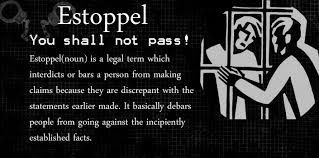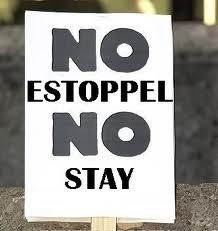ESTOPPEL

Estoppel is derived from an old French word Estoupail which means stop and hinder.
In simple words we can say that estoppel means that party is prevented by his own acts from clalming a right to determine of other party who was entitild to rely on such conduct and has acted accordingly.

Rules of estoppel
- The rule of estoppel is based on law of equity.
- The rule of estoppel is based on question of fact .
- The plea of estoppel is not based on Wavier of right.
- It is based in evidnce and pleading.
- It can used weapon of defence.
Types of estoppel
- by record or judgement.
- by deed
- by conduct.
- By record or Judgement
Where a final judicial decision has been pronounced by a judicial tribunial of competent authority over the parties to and the subject matter of the litigation or any party to shuch litigation or im case of decision of rem is estoppel.
- By deed.
When a person has entered into solemn engagement by deed under seal with antoher party he or the perswon claimning through or under him shall not be allowed to set up the contrary of his assertionin rthe deed.
3.By conduct:
It is known as estoppel by conduct or representation it may arise from contract and agreement.

Where the rules of estoppel is not apply:
- There is no estoppel on a point of law.
- The principle of estoppel can not be invoked to defeat the the plain provision of a statute.
- Estoppel is deals fact not a right.
- Rule of estoppel can not defeat the provision of constitution.



